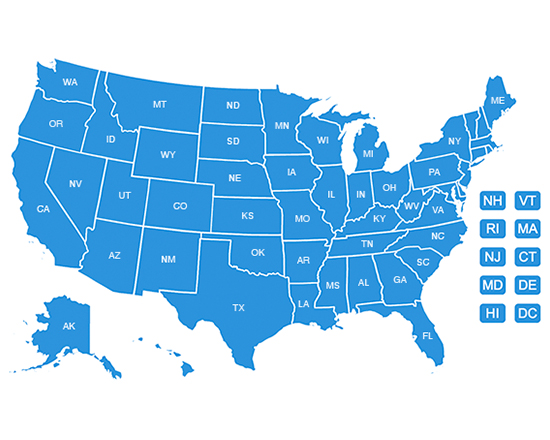The Nursing Home Law Center is committed to providing the legal resources necessary to hold negligent facilities accountable.
Stage 4 Bed Sores
Expert Legal Counsel for Stage 4 Pressure Ulcers in Nursing Homes
Stage 4 bed sores are the most severe form of pressure ulcers, extending deep into the muscle, tendon, and even bone. These wounds are not only extremely painful but also put nursing home residents at high risk of fatal infections, including sepsis.
Pressure injuries like these are largely preventable with proper treatment. When a resident develops a stage 4 lesion, it is often a clear sign of neglect, as adequate repositioning, hygiene, and medical attention should prevent bed sores from reaching this advanced stage.
If your loved one developed a stage 4 pressure ulcer in a nursing home, you may have a case. Contact our nursing home bedsore attorneys today for a free case review to explore your legal options.
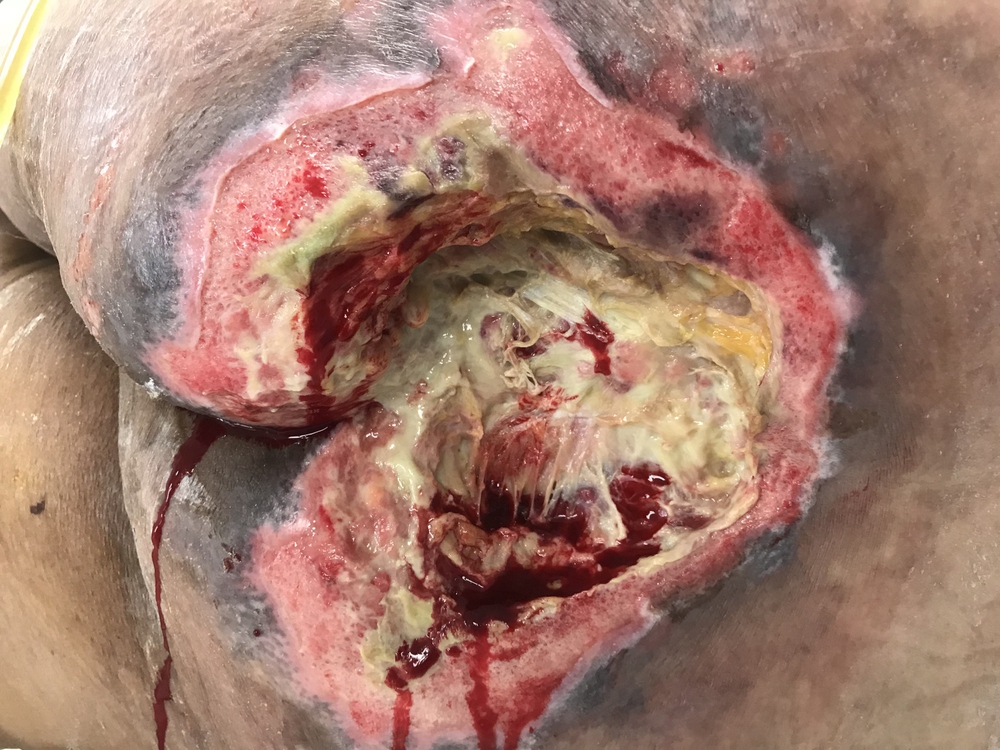
Nursing Home Bedsore Settlements
When nursing homes fail to prevent or properly treat bed sores, legal action can hold them accountable.
Stage 4 sores are a clear sign of neglect, as proper medical care should stop pressure injuries from progressing to this severe stage. Lawsuits not only provide financial compensation for stage 4 victims and their families but also push facilities to improve care standards and prevent future harm.
Some of our bedsore case settlements include:
- $12,800,000 – Nursing home abuse verdict for a resident who died after suffering from untreated bed sores.
- $2,150,000 – Wrongful death settlement involving bed sores at a severe stage 4 that led to fatal sepsis.
- $3,245,000 – Settlement for a patient who developed multiple decubitus ulcers in a long-term care hospital.
- $395,000 – Nursing home decubitus sore case where staff failed to prevent bed sores or notify the family, leading to a resident’s death from sepsis within 30 days.
- $875,000 – Hospital bed sore settlement for a patient who suffered severe pressure ulcers due to inadequate care.
The value of a bed sore lawsuit at stage 4 depends on several factors, including the severity of the injury, the level of facility negligence, and the legal strategy used to pursue the claim.
Cases of stage 4 ulcers involving wrongful death or long-term suffering often result in higher settlements, while clear evidence of neglect—such as missing medical records, the severity of stage 4 cases, or ignored treatment plans—can strengthen a case against a facility.
If your loved one suffered stage 4 severe pressure injuries, a legal claim can help cover medical costs, pain, and suffering and hold negligent facilities accountable. Contact us today for a free case review to explore your options.
What Are Pressure Ulcers?
Pressure ulcers are open wounds that develop due to prolonged pressure on the skin. When a person remains in the same position for extended periods, blood supply is restricted, cutting off oxygen to the underlying tissue. Over time, this lack of circulation causes skin and tissue death, leading to painful wounds that can expose tendons, muscles, and even bone.
Nursing home residents with limited mobility are at the highest risk. Those who are bedridden or use wheelchairs rely on staff to help them reposition regularly and provide proper skin care. Without this attention, pressure ulcers can rapidly progress to stage 4 wounds, which pose a serious risk of infection and severe complications.
Stages of Pressure Sores: How They Progress to Stage 4
Stage 4 pressure ulcers don’t happen overnight. Instead, they develop in stages, progressing from mild skin irritation to deep, life-threatening wounds if left untreated.
Stage 1: Early Warning Signs
Stage 1 presents redness and irritation on the skin, caused by restricted blood flow. In this early stage, the skin may feel warmer or cooler than the surrounding area. Early intervention at this stage can prevent further reaching stage 4 and protect the individual’s overall health.
Stage 2: Breakage of the Skin’s Layers
Stage 2 causes the skin to break open, forming a shallow wound or blister that exposes the underlying layers. If left untreated, the wound can deepen and risk developing into Stage 4.
Stage 3: Deep Tissue Damage
Stage 3 extends through all skin layers, exposing fat tissue beneath. If not addressed, this stage can progress to stage 4, leading to greater risks of infection and severe damage.
Stage 4: Severe Tissue Damage
Stage 4, the most severe form, exposes tendons, muscle, and bone. At stage 4, the wounds cause extreme pain and can lead to fatal infections like sepsis if not treated immediately.
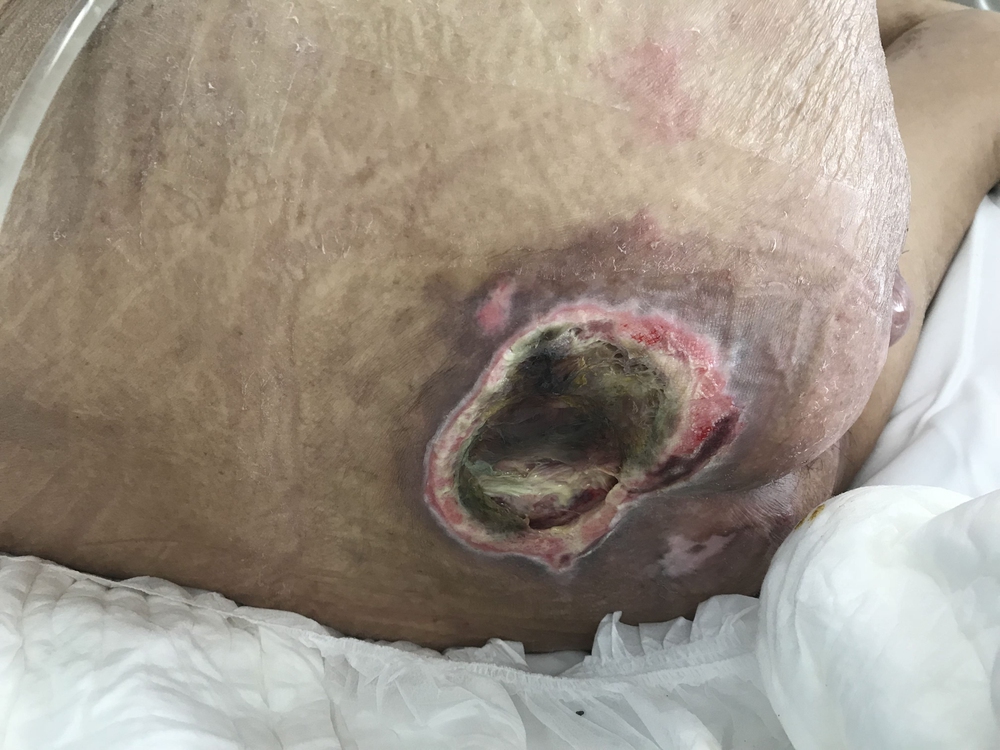
Unstageable Pressure Ulcers
Unstageable pressure ulcers are covered with dead tissue, making it impossible to assess the full depth of the injury. Suspected deep tissue injury (DTI) may be present, which requires urgent medical intervention to avoid further harm.
Most stage 4 sores are completely preventable. Early pressure ulcers are also easily remedied if spotted, and any nursing facility should be aware and knowledgeable about proper prevention and best practices for treating pressure sores.
That’s why no resident should ever develop a stage 4 ulcer if nursing home staff provide adequate treatment, including regular repositioning, wound care, and skin monitoring. As a result, when a facility allows pressure injuries to reach this advanced stage 4, it is often a sign of severe neglect and abuse.
Common Locations of Stage 4 Ulcers in Nursing Home Residents
Stage 4 sores develop in areas where bone and skin are in constant contact with a surface, leading to prolonged pressure and tissue damage. Nursing home patients who are bedridden or have limited mobility are at the highest risk, but where do stage 4 sores present themselves on the body?
- Tailbone and buttocks – The most common area for a stage 4 ulcer due to prolonged sitting or lying down.
- Shoulder blades and back of the head – Frequent in bedridden residents who are not given the right care and repositioned regularly.
- Ankles and heels – Develop to stage 4 when legs remain in the same position for long periods without support.
- Hips and lower back – Often caused by improper repositioning or inadequate cushioning.
Without frequent movement, pressure relief, and skin monitoring, these areas are vulnerable to deep, stage 4 wounds that reach subcutaneous tissues and expose muscle, tendons, and bone, leading to severe pain and infection risks.
Causes of Stage 4 Pressure Ulcers in Nursing Facilities
It’s important to keep in mind that stage 4 pressure ulcers do not develop overnight. They are the result of prolonged neglect and inadequate care. When nursing home staff fail to take proper precautions, minor abrasions can escalate into deep, lethal wounds.
Nursing Home Neglect and Understaffing
Often, the blame for severe pressure injuries can fall on nursing home staff who fail to deliver the suitable care their residents need. Examples of abuse causing stage 4 pressure ulcers include:
- Failure to reposition immobile or bedridden residents leads to constant pressure that cuts off blood flow. Over time, this leads to a stage 4 sore.
- Inadequate wound dressing allows minor pressure sores to worsen into stage 4-grade sores instead of healing.
- Poor hygiene and incontinence care increase the risk of infections in exposed wounds.
- Staff ignoring early warning signs of pressure ulcers, delaying critical treatment and allowing them to progress to stage 4.
Bacterial Infections
Not treating even minor pressure sores makes them highly susceptible to bacterial infections, including MRSA, Staph, and E. coli. Once infected, a minor pressure ulcer can rapidly deteriorate into a stage 4 sore, leading to:
- Sepsis – A life-threatening bloodstream infection.
- Osteomyelitis – A dangerous bone infection that can require amputation.
- Cellulitis – A painful skin infection that affects soft tissue and can spread rapidly if not immediately recognized and treated.
Health Conditions
Certain medical conditions make residents more vulnerable to developing pressure ulcers. Here are some common ones:
- Diabetes and circulatory problems slow blood supply, resulting in slower wound healing and increased infection risks.
- Neurological disorders like stroke, Alzheimer’s, and Parkinson’s reduce sensation and mobility, making residents unaware of developing stage 4 sores. Patients with neurological disorders often have a limited ability to communicate their pain and suffering, making it more likely for them to develop bedsores during the course of their treatment.
- Malnutrition and dehydration weaken the immune system and skin integrity, leaving residents prone to rapid skin breakdown. In these cases, stage 4 pressure injuries develop faster than they would on healthy skin.
Without proper care, monitoring, and timely intervention, these risk factors can turn a treatable wound into a severe, life-endangering injury.
Pressure Ulcers on Different Skin Tones
Tragically, for darker-skinned nursing home residents, the risk of undiagnosed and untreated pressure ulcers is even higher.
On lighter-skinned individuals, early pressure sores appear red and inflamed, making them easier to identify.
However, in Black and brown residents, these warning signs often appear as deep purple, blue, or subtle discoloration—signs that many undertrained caregivers fail to recognize. As a result, pressure sores on patients with darker complexions are often ignored until they have already progressed to dangerous stages, reaching stage 4 level fast.
Every nursing home resident deserves the same standard of care, regardless of skin color. If your loved one developed a stage 4 sore due to neglect, especially if their early symptoms were dismissed or ignored, you have the right to hold the facility accountable.
Symptoms of a Stage 4 Skin Ulcer
Stage 4 pressure ulcers are large, deep wounds that extend through all layers of skin, exposing muscle, tendons, or bone and emitting a foul-smelling fluid. They are serious, and a stage 4 ulcer may require treatment in an intensive care facility.
At advanced stage 4, wounds are extremely painful and pose a high risk of deadly complications, including infection.
- A deep lesion with visible muscle, tendon, or bone.
- Foul-smelling drainage, pus, and dead tissue, indicating severe stage 4 infection.
- Severe pain, swelling, and blackened skin (necrosis) due to tissue death.
- Signs of systemic infection, such as fever, chills, confusion, or weakness, may indicate sepsis.
If you suspect a loved one has developed a stage 4 lesion, seek medical and legal attention immediately.
Stage 4 wounds require urgent treatment to prevent further complications and often point to systematic failure of care in a nursing home or residential facility. Do not accept assurances that the injuries will be treated properly going forward. Contact a nursing home abuse lawyer to explore legal options and hold negligent facilities accountable.
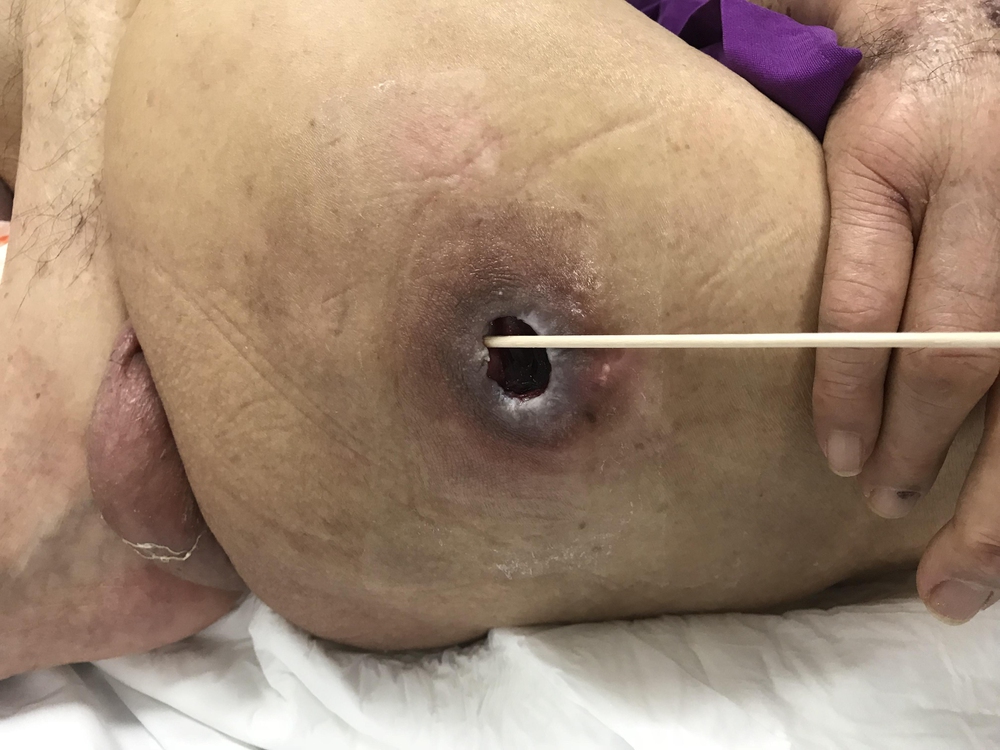
Complications of Stage 4 Sores: When Pressure Ulcers Turn Deadly
When a stage 4 ulcer is not treated, the consequences can be devastating. At this advanced stage, the wound is deep, exposing tissue to dangerous infections that can quickly become life-threatening.
- Sepsis and Septic Shock – A severe bloodstream infection where the body damages its own tissue. Sepsis, whether from a stage 4 ulcer or otherwise, can lead to organ failure and death if not treated immediately.
- Osteomyelitis – A bone infection that can spread from the stage 4 ulcer, often requiring surgery or amputation to prevent further damage.
- Gangrene and Necrosis – Tissue death is caused by a lack of blood flow, which can spread rapidly and may necessitate surgical removal of affected areas.
- Death – Over 60,000 deaths each year are linked to complications from untreated ulcers, making bed sores one of the deadliest forms of nursing home neglect.
Stage 4 ulcers should never reach this level with proper care. If a loved one has suffered serious complications or death due to a preventable stage 4 pressure ulcer, legal action can help hold negligent homes accountable.
Preventing Stage 4 Pressure Injuries in Nursing Homes
Stage 4 ulcers are entirely preventable when homes follow proper care protocols. Facilities have a legal duty to protect residents from even minor pressure injuries by implementing essential prevention measures, including:
- Repositioning residents every two hours to relieve pressure on vulnerable areas.
- Using specialized mattresses and cushions to minimize skin breakdown and reduce the risk of sores.
- Providing proper nutrition and hydration, such as a nutritious, high-protein diet, is critical for maintaining skin integrity and supporting immune function.
- Regular wound monitoring and early intervention to identify and treat pressure ulcers before they become stage 4 wounds.
These treatment protocols are not simply recommendations to promote healing. Assisted living facilities are legally required to follow these prevention strategies and offer appropriate medical care.
When facilities fail to take these basic steps, leading to a stage 4 pressure ulcer, it is often a clear case of nursing home neglect. If your loved one suffered from a stage 4 wound due to inadequate care, you have the right to hold the facility accountable.
Legal Rights: Can You Sue a Nursing Home for a Stage 4 Bed Sore?
Stage 4 skin ulcers are almost always a sign of severe neglect.
Legal Responsibility of Staff for Stage 4 Sores
Staff are legally responsible for preventing stage 4 sores through regular repositioning, proper wound management, and early medical intervention. When they fail in these duties, the consequences can be deadly, and families have the right to take legal action.
Facilities have a legal obligation to protect residents from preventable harm, yet many fail to do so due to poor training, understaffing, or deliberate cost-cutting measures. If staff failed to reposition a resident, ignored signs of developing bed sores, or failed to provide timely medical treatment, they may be legally liable for the resulting injury.
In some cases, medical records of residents may show that doctors or nurses ignored warning signs, delaying medical care until the wound had already reached a critical stage 4.
The Impact of Understaffing on Stage 4 Sores
Understaffing is another common factor in these cases. When nursing homes do not have enough caregivers to meet residents’ needs, basic tasks like hygiene, wound dressing, and repositioning are neglected, allowing minor pressure ulcers to rapidly escalate into stage 4 wounds, fatal infections, and extensive tissue damage.
Seeking Compensation for Stage 4 Sores
If your loved one has suffered from a stage 4 pressure ulcer due to inadequate care, you may be entitled to compensation for medical expenses, pain and suffering, and other damages.
Remember, holding negligent facilities accountable for not treating pressure sores is not only about justice. It also ensures that no other residents endure the same suffering as a result of a pressure ulcer left untreated.
If your loved one has been a victim of a stage 4 ulcer, get a free case review today to explore your legal options and take the first step toward holding the facility responsible.
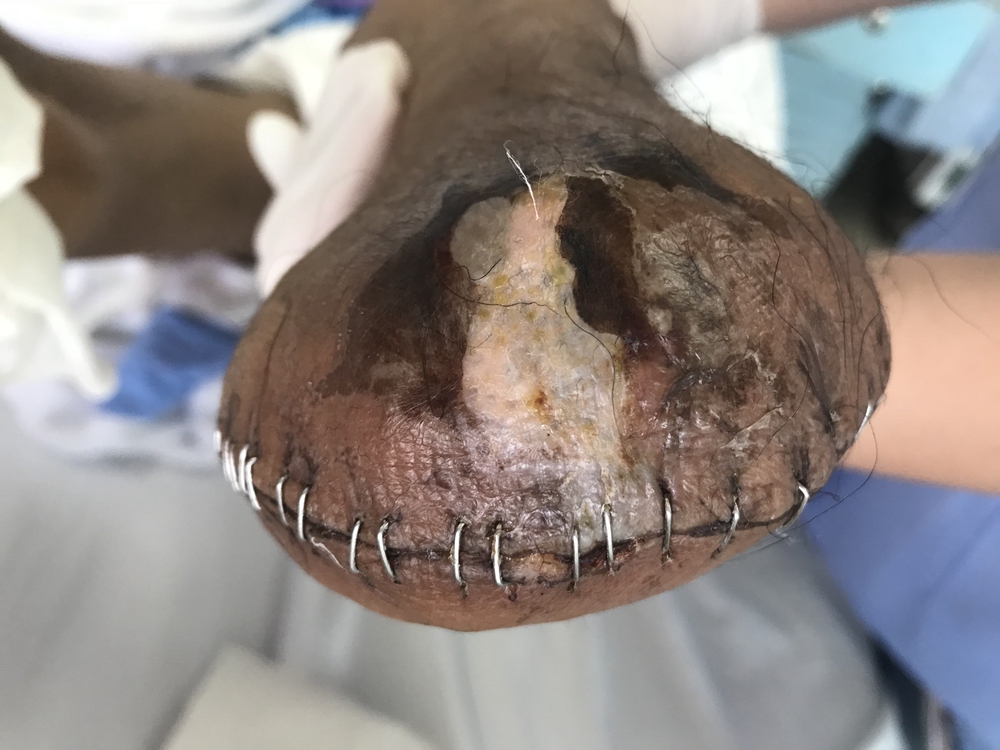
Laws and Legal Protections
Nursing home residents are protected by various laws that require facilities to provide a safe environment and adequate medical care.
The Federal Nursing Home Reform Act (OBRA 1987)
At the federal level, the Nursing Home Reform Act, part of the Omnibus Budget Reconciliation Act of 1987, establishes national standards for homes that receive Medicare and Medicaid funding.
This includes regulations requiring facilities to develop a comprehensive care plan for each resident, with specific measures to prevent and treat bed sores. Failure to comply with these standards can result in penalties and loss of funding.
The Elder Justice Act
Part of the Affordable Care Act, the Elder Justice Act, is designed to combat elder abuse, neglect in treatments, and exploitation.
It requires states to create systems for reporting abuse and to establish programs for preventing senior abuse, including the development of training programs for nursing home staff to recognize and prevent stage 4 wounds.
The Health Care Financing Administration (HCFA)
HCFA regulations outline requirements for wound management, infection control, and the prevention of stage 4 skin ulcers, setting a minimum standard for assisted living home care across the nation.
These laws collectively create a framework that holds senior care homes accountable for their treatment of residents, especially when it comes to preventing injuries like skin ulcers. If your loved one has suffered from neglect or abuse in a nursing center, understanding these laws can help you pursue legal action and ensure the facility is held accountable.
Compensation for Stage 4 Bed Sore Lawsuits
Families have the right to pursue compensation for the harm their loved one has suffered with a stage 4 sore. A lawsuit can help recover damages for the significant costs associated with these injuries, ensuring families are not left to bear the financial burden of a preventable medical crisis.
One of the most significant areas of compensation is medical expenses, which can be substantial.
Stage 4 skin ulcers often require hospitalization, multiple invasive surgeries, skin repair, infection treatment, and long-term rehabilitation, all of which can create overwhelming medical bills. When a care home fails in its duty to prevent stage 4 injuries, the facility should be held responsible for covering these costs.
Pain and suffering are also major factors in these cases. Stage 4 wounds cause excruciating physical pain, emotional distress, and a significant decline in quality of life. Many residents experience depression, anxiety, and isolation due to their injuries, especially if they become bedridden or lose mobility as a result of a stage 4 injury.
A lawsuit can compensate for the suffering endured as a direct result of the nursing home’s neglect.
If a resident dies due to complications from a stage 4 pressure ulcer, their family may be able to file a wrongful death lawsuit. The financial and emotional toll of losing a loved one in such a painful and preventable way cannot be overstated.
Compensation in these cases can help cover funeral and burial expenses, loss of companionship, and the trauma of knowing their loved one’s death was the result of neglect.
In cases of extreme negligence leading to developing bedsores at stage 4, courts may also award punitive damages to punish the facility and deter similar misconduct in the future.
These damages are meant to send a clear message that facilities cannot cut corners at the expense of residents’ health and safety. If a facility’s failure to prevent or treat bed sores was especially reckless, punitive damages may significantly increase the total compensation awarded.
How a Nursing Home Abuse Lawyer Can Help
Filing a lawsuit against a negligent facility responsible for stage 4 sores can be overwhelming, but an experienced nursing home abuse lawyer can handle every aspect of the case, ensuring families get the justice and compensation they deserve.
Investigating Nursing Home Neglect
A strong case begins with a thorough investigation into how the pressure ulcer developed and whether the home provided proper care. Because stage 4 skin ulcers are almost always preventable, proving neglect is often a matter of uncovering failures in staffing, healthcare, and documentation.
An experienced attorney will gather critical evidence to build a compelling case and hold the facility accountable.
A lawyer will request all relevant medical records, lesion care reports, and treatment logs to determine whether the nursing home properly monitored and treated the resident’s condition before it developed into a stage 4 sore. Records of missed repositioning schedules, lack of care, or delays in medical intervention can provide direct evidence of neglect.
Understaffing is a major contributor to nursing home neglect. Legal teams will review staffing logs, training records, and shift schedules to see if the facility had enough caregivers on duty and whether staff members were properly trained in stage 4 pressure ulcer prevention.
Witness statements are essential in exposing patterns of neglect. Attorneys may interview:
- Nursing home staff to assess whether they were given proper resources and training.
- Other residents who may have witnessed neglect or experienced similar issues.
- Family members who raised concerns about care but were ignored.
- Medical professionals who can testify about the severity of the stage 4 injury and whether the standard of care was followed.
Medical experts play a critical role in stage 4 pressure ulcer cases. These specialists can analyze wound progression, treatment effectiveness, and facility compliance with medical standards. Their testimony helps establish how neglect, not unavoidable medical conditions, caused the bed sore to progress to stage 4.
Some homes have security cameras in common areas, which may provide visual evidence of neglect, such as residents being left unattended for long periods. Internal emails and memos can also reveal whether facility administrators ignored complaints, cut corners in care, or attempted to cover up negligence.
Many facilities with neglect cases already have a history of violations. Attorneys will check state and federal inspection reports, citations, and prior lawsuits to determine if the facility has a pattern of failing to provide adequate care.
By gathering this evidence, an experienced nursing home abuse lawyer can prove that the facility’s failures directly led to the development of a stage 4 pressure ulcer, making them legally responsible for the suffering and damages caused.
If your loved one experienced neglect, taking legal action can hold the nursing home accountable and help prevent further harm to other residents.
Negotiating Settlements or Taking the Case to Trial
Most nursing home abuse cases involving stage 4 skin sores are settled out of court, as facilities and their insurance companies prefer to avoid the cost and public exposure of a trial. A skilled attorney will negotiate aggressively to secure a fair settlement that covers medical expenses, pain and suffering, and other damages.
However, if the nursing home refuses to take responsibility or offers an inadequate settlement, the case may go to trial, where a jury can award a larger verdict based on the severity of the neglect.
Our attorneys work on a contingency fee basis, meaning there are no upfront costs, and you only pay if we win your case. If your loved one suffered from a stage 4 pressure ulcer due to nursing home neglect, contact us today for a free case review to explore your legal options.
Consult an Experienced Lawyer for a Free Case Review!
Stage 4 lesions should never happen in a properly staffed and well-managed nursing home. Families should not have to watch their loved ones suffer from a preventable stage 4 injury caused by understaffing, ignored medical warnings, or deliberate cost-cutting measures.
If a nursing home allows your loved one to develop a stage 4 pressure ulcer, they must be held accountable. Call (800) 926-7565 or fill out our online form for a free case review.
Learn More About Bed Sores


